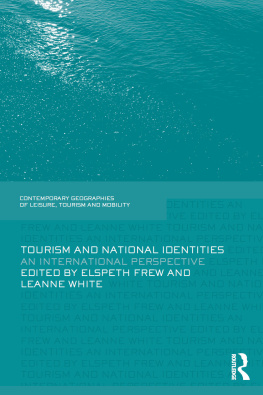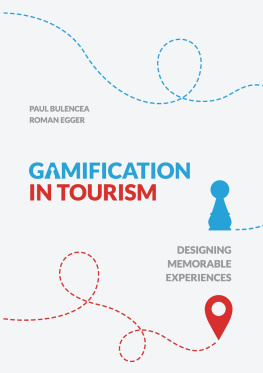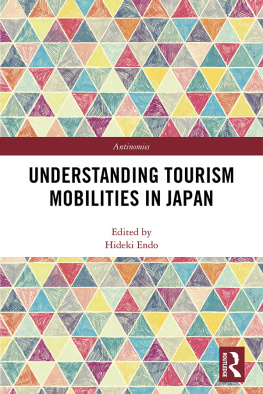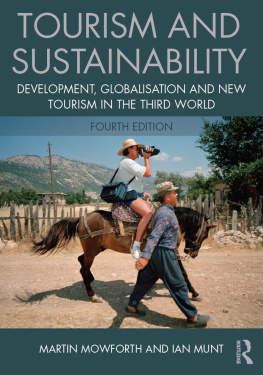Thanatourism and Cinematic Representations of Risk
In todays world, the need to eliminate natural and human-made disasters has been at the forefront of national and international socio-political agendas. The management of risks such as terrorism, labour strikes, protests and environmental degradation has become pivotal for countries that depend on their economys tourist sector. Indeed, there is fear that that the end of tourism might be nigh due to inadequate institutional foresight. Yet, in designing relevant policies to tackle this, arts such as that of filmmaking have yet to receive due consideration.
This book adopts an unorthodox approach to debates about the end of tourism. Through twenty-first-century cinematic narratives of symbolically interconnected risks, it considers how art envisages the future of humanitys well-being. These risks include: migration as an infectious disease; alien incursions as racialised labour mobilities; cyborg rebellion as the fear of post-colonial otherness; and zombie anthropophagy as the replacement of rooted identities by nomadic lifestyles.
Such filmic scenarios articulate the futuristic survival of community as the triumph of the technological human over otherness, and provide a means to debate societal risks that weave identity politics into unequal mobilities. This book will appeal to researchers and students interested in mobilities theory, tourism and travel theory, film studies and aesthetics, globalisation studies, race, labour and migration.
Rodanthi Tzanelli is Associate Professor of Cultural Sociology at the University of Leeds, UK.
Routledge Advances in Sociology
163 Addiction, Modernity, and the City
A users guide to urban space
Christopher B.R. Smith
164 Medicine, Risk, Discourse and Power
Edited by John Martyn Chamberlain
165 Pragmatic Humanism
On the nature and value of sociological knowledge
Marcus Morgan
166 The Social after Gabriel Tarde
Debates and assessments, 2nd edition
Edited by Matei Candea
167 Dynamics of National Identity
Media and societal factors of what we are
Edited by Peter Schmidt, Josef Seethaler, Leonie Huddy and Jrgen Grimm
168 Beyond Capital
Values, commons, computing, and the search for a viable future
David Hakken, Maurizio Teli and Barbara Andrews
176 Thanatourism and Cinematic Representations of Risk
Screening the end of tourism
Rodanthi Tzanelli
177 The Decent Society
Planning for social quality
Pamela Abbott, Claire Wallace and Roger Sapsford
178 The Politics and Practice of Religious Diversity
National contexts, global issues
Edited by Andrew Dawson
179 So Paulo in the Twenty-First Century
Spaces, heterogeneities, inequalities
Edited by Eduardo Marques
180 State Looteries
Historical continuity, rearticulations of racism, and American taxation
Kasey Henricks and David G. Embrick
181 Lesbian, Gay, Bisexual and Trans* Individuals Living with Dementia
Concepts, practice and rights
Edited by Sue Westwood and Elizabeth Price
First published 2016
by Routledge
2 Park Square, Milton Park, Abingdon, Oxon OX14 4RN
and by Routledge
711 Third Avenue, New York, NY 10017
Routledge is an imprint of the Taylor & Francis Group, an informa business
2016 Rodanthi Tzanelli
The right of Rodanthi Tzanelli to be identified as author of this work has been asserted by him in accordance with sections 77 and 78 of the Copyright, Designs and Patents Act 1988.
All rights reserved. No part of this book may be reprinted or reproduced or utilised in any form or by any electronic, mechanical, or other means, now known or hereafter invented, including photocopying and recording, or in any information storage or retrieval system, without permission in writing from the publishers.
Trademark notice: Product or corporate names may be trademarks or registered trademarks, and are used only for identification and explanation without intent to infringe.
British Library Cataloguing-in-Publication Data
A catalogue record for this book is available from the British Library
Library of Congress Cataloging-in-Publication Data
A catalog record for this book has been requested
ISBN: 978-1-138-65264-4 (hbk)
ISBN: 978-1-315-62410-5 (ebk)
Typeset in Times New Roman
by Wearset Ltd, Boldon, Tyne and Wear
Writers revise ideas all the time. In the latter stages of his career, Wittgenstein invented the term language-game to designate forms of language simpler than the entirety of a language itself, consisting of language and the actions into which it is woven (1953: 7) and connected by family resemblance (Familienhnlichkeit). Such family resemblances referred to the ways meaning emerges contingently and to the epidermic or surface likeness of words, like phenomenal similarities shared by members of biological families. The concept was intended to bring into prominence the fact that the speaking of language is part of an activity, or a form of life (ibid. 23) which gives meaning to language. One may consider humour in the form of puns as an elaborate language game, a social science methodology that produces interpretive ingredients during moral and aesthetic incongruities we employ to argue against the System on its own terms (Lippitt in Watson 2015: 416). We all belong to systemic families, but do not necessarily accept their values.
I have been victim of my own language games before interpreting and using them. Recently, a friend of mine jokingly noted that during a casual encounter with a colleague, he inquired about his current research. His colleague responded that he develops camp theory, upon which my friend helpfully proceeded to suggest the book of a gender theorist. This proved wide of the mark, as his colleague was simply referring to contemporary migration, poverty and the subsequent proliferation of camps around the world to contain the poor hordes. An unintended pun turned into a joke between my friend and I, upon reflection: scholars mess up their specialisms in todays interdisciplinary investigations. But while we were joking about all these, I would also reflect independently on how I repeatedly used conceptions of gender as allegory and synecdoche in my work to designate more socially blended aesthetic exclusions from global hierarchies of value. Borrowing freely from gender theory, I gave the impression that I deal with cosmetics, when my focus was the discursive nuances under which the state of exception (in Agambens terms) circulates in consumption fields such as those of media and tourism. Gender always stands for something else in my work and a book on camp, however interesting, may end up in a closet unread. This is not to say that gender does not partake in aestheticised exclusions, only to stress that for me its theoretical presence is of interest only within a constellation of variables (race, class, status) that maintain intersectional identities.







